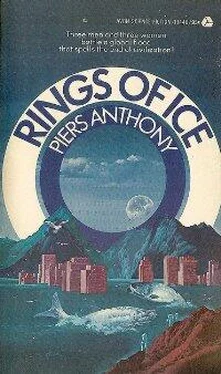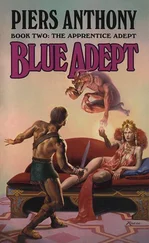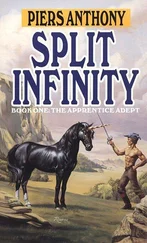“No!” Gus cried in terror.
“Second, a promise,” Floy said. She tore off her soaking clothing to reveal her slender but rather attractively developed body. “The moment we have shelter, you and I are going to have a lot of fun, you know what kind.”
That disgusted Zena—but not the way it once might have. It was evident that it was a very real inducement to Gus, who had always admired Floy’s body and had had recent experience of its potentials. Even Thatch was looking at Floy with male appreciation. Sex, obviously, always loomed large in the interests of men, and now it was an excellent tool. Perhaps that was why men had been evolved with the desire, the women with the appeal. If women had craved it as men did, they would never have been able to use it effectively.
“Third,” Floy continued, “if you do not move this instant I will give you this.” And she flicked one finger out from her palm, the long nail gleaming. The effect was like the sudden opening of a switchblade, right under Gus’s nose. The nail made a little quiver, as of an incipient thrust at the man’s left eye, and Gus hurled himself away and into the rain.
Floy did have the necessary qualities of leadership!
Zena lay under the shelter, feeling the pangs of what threatened to be forthcoming labor. “But it is only eight months!” she cried. “Too soon. Too soon!”
Floy came to sit beside her. In the past month of industry, the girl had grown subtly. Her coordination had become almost normal, and there was an air of competence about her that was reassuring. Of all the group, she had adapted best to the necessities of Mindel. “How do you know?” Floy asked.
“I kept count!”
“You started with Thatch just after Gunz.”
“That was ten months ago!” Zena sounded shrill in her own ears.
“Right. So it could be nine months now for the baby, or even overdue. Why worry about it?”
“It’s eight months! I know. I don’t want it premature!”
Floy had learned not to argue with unreasonable women. “I’ll get you some green soup.”
“Who’s going to deliver the baby?” Zena cried. “I wish Karen were here… or even Gloria.”
“Karen is here—in spirit. Her body is part of ours, part of your baby’s too. She makes us strong, the same way. Gloria, too.”
Floy’s only moments of weakness were still when she remembered Gordon. Now it was only a pause, a silence, a moment of rather pretty sadness.
Then something made them both listen, startled. “What is it?” Zena demanded.
“The rain’s stopping!” Floy cried. “Mindel’s down! And Ring Riss, and Ringworm…”
“Ringworm!” Zena echoed, and started laughing uncontrollably. Floy joined her. Together they lay and looked out of the rock shelter, weak from foolish mirth.
They crawled out and looked at the sky. A huge band of cloud remained, but the configuration had changed. To the south the sky was clear; to the north it looked as though the rain continued.
“The whole canopy is drifting into the polar opening,” Zena said. “There’s not enough vapor left to support the full cloud cover!”
“We made it through!” Floy said. “We made it!”
In a moment they heard a halloo, and Gus came charging up the mountain slope. “The rain stopped!” he yelled unnecessarily.
They waited for Thatch, then commenced an exploration of the post-canopy world. It was spectacular, now that the fog had lifted and the slanting sunlight touched the earth. Zena had to shield her eyes, unused to the direct sunlight for six months and more. The glare seemed intolerable at first, but she squinted happily.
Little vegetation of the old style remained, for the rain had washed out roots and soil. But the new moss that clung to rock was luxuriant, coating every partially protected surface with green and gray and brown.
The hardest rock had held up; but anything susceptible to erosion by water or gravel had been cleaned out. Gullies like the Grand Canyon opened below their residence. And the new volcanism had altered the landscape in its own fashion. Steam issued from cracks in the stone, and the water that flowed near these vents was hot.
To the west, Crack Toe smoked calmly. This was the first time they had actually seen it. Zena was almost disappointed to find that it was a rather small development, not even properly conical. It was a gap in the side of a regular mountain, with a dribble of solidified lava trailing beneath it. Who would have believed that all that noise and motion could have emanated from that!
Below was the ocean—the real ocean, now. They stood on an island a few miles across, surrounded by other islands: the tops of the former Appalachians. All the rest of the world had been drowned.
They picked their way down to that great sea, two thousand feet above the level of the old one. Already the moss was beginning to wither, as it was dependent on the thorough moisture of the rain and fog. But there was no concern about food; there was life in the ocean. Apparently the fish had adapted to the breakup of their spawning grounds and the dilution of the salt water and had multiplied during the storm.
Zena marveled at that. She had thought the limits were much narrower. For one thing, she had understood that much sea life was dependent on direct sunlight. But she could think of two explanations: first, that there had been many quick extinctions, as in ages past, leaving room for those better able to cope with the changed environment. Second, that this type of thing had indeed happened before, so that the creatures of the sea had prior experience. No doubt there had been an explosion of the fungus life in the sea as well as on land, providing an alternate source of food. Fungus was independent of light, so it was always ready to fill the vacuum.
What had happened to the fishes of the sea at the time of Noah’s flood? Geologically, this was still soon after that deluge. The sea creatures would not have forgotten, genetically, how to handle it.
In addition, the warmth of the water, plus the wealth of refuse washed down from land, had provided an ideal growth medium for those species ready to take advantage of it. The net would feed the little party of four people and two animals indefinitely.
“The world is ours,” Gus said, pleased. His whole personality seemed to have sprung back the moment the rain stopped. Had he already sealed off the deluge as a nightmare?
A sinuous ripple approached. It was an alligator, a large one. The reptiles, like the fish, were doing well!
“This warm weather, and all that water,” Zena murmured. “The cold-blooded creatures thrive on it. The world is really theirs.”
The alligator poked its head up on shore, and the four people stepped back hastily. They had no real fear of it, because they were better equipped to maneuver on the land. But it did seem that Man was now a minority species on the planet.
“We’ll have to make a raft,” Gus said. “Travel about, find others like us, start civilization over.”
Zena, long on her feet, suddenly sat down on a mossy rock. “Oh-oh,” Floy said. “Raft’s going to have to wait.”
“Look!” Gus cried, pointing across the water. “A boat!”
“Just let me rest,” Zena said. “It’s not due yet.”
“Halloo!” Gus called, waving his hand in the air.
“Listen,” Roy said, “I’m no expert, but I think it is due. We’ve got to get you back home.”
Thatch’s head turned back and forth. He didn’t know whether to watch the boat or help Zena. But his decision was soon made. “A stretcher,” he said. “We’ll make a stretcher and carry you back.”
“It’s coming!” Gus exclaimed. “Two men.”
“There’s nothing to make a stretcher,” Floy said. “We’ll have to set up right here. See if there’s a hot spring near.”
Читать дальше










